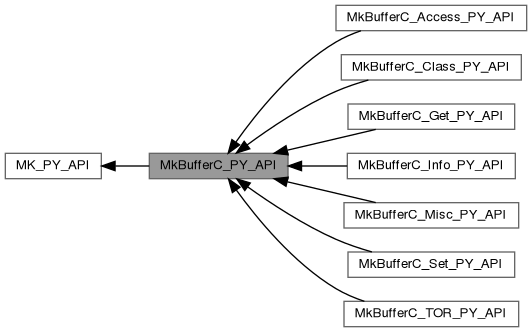MkBufferC - the abstract class known as buf or buffer is used to create and manage dynamic, generic, mixed typed data. … More...
 Collaboration diagram for MkBufferC_PY_API:
Collaboration diagram for MkBufferC_PY_API:Topics | |
| MkBufferC_Class_PY_API | |
| MkBufferC - define the class … | |
| MkBufferC_TOR_PY_API | |
| MkBufferC - various functions to create, initialize and destroy a MkBufferC … | |
| MkBufferC_Get_PY_API | |
| MkBufferC - various functions to get buffer-data … | |
| MkBufferC_Set_PY_API | |
| MkBufferC - various functions to set buffer-data … | |
| MkBufferC_Info_PY_API | |
| MkBufferC - various functions to get information out of buffer-data … | |
| MkBufferC_Access_PY_API | |
| MkBufferC - various functions to access buffer-data … | |
| MkBufferC_Misc_PY_API | |
| MkBufferC - various functions to work on buffer-data … | |
Detailed Description
MkBufferC - the abstract class known as buf or buffer is used to create and manage dynamic, generic, mixed typed data. …
The MkBufferC is used to store PRIMITIVE TYPE data. If pymkkernel is working on data… pymkkernel is working on an MkBufferC object or on a list of MkBufferC objects called MkBufferListC.
MkBufferC CLASS
The ABSTRACT-CLASS used to store a native-type-data-item defined by PRIMITIVE TYPE …
C-Kernel-Details
The ABSTRACT-CLASS MkBufferS is used to store MkTypeE data in an MkBufferS::storage …
A new MkBufferS is always preallocated with the predefined ILS-storage (MkBufferS::ils_data), but can switch to a MALLOC-storage if the storage requirements of the user exceed the predefined MkBufferS::ilsS::size.
A MkBufferS never run out of storage.
The basic goal of the ILS-storage technology is to minimize the usage of MALLOC, this mean that the MkBufferS::ilsS::size should be large enought to be sufficient for the user needs.
The following conditions must always be met for the ILS memory:
- The MkBufferS::ils_data have to be always the last item in the last subclass of MkBufferS
- The MkBufferS::ilsS::offset is calculated as:
MkBufferSPtr->ils_data - MkBufferSPtr.
The ABSTRACT-CLASS MkBufferS is missing the ILS-storage, the FINAL-CLASSES are:
- See also
- MkBufferListC, MkBufferStreamC
MkBufferC CTOR / DTOR
| command | synonmym |
|---|---|
[constructor,static] MkBufferC MkBufferC.Create(?size:int32=0?) | pymkkernel.MkBufferC(?size:W=0?) |
[destructor] buf.Delete() | buf = None |
Example from server.py → read a buffer-object and convert single-char-type-identifer to string.
def BUF2(self): self.SendSTART() for i in range(3): buf = self.ReadBUF() self.SendSTR(buf.GetType1()) self.SendBUF(buf) self.SendRETURN()
Generated on Thu May 29 2025 13:13:26 for theKernel by
